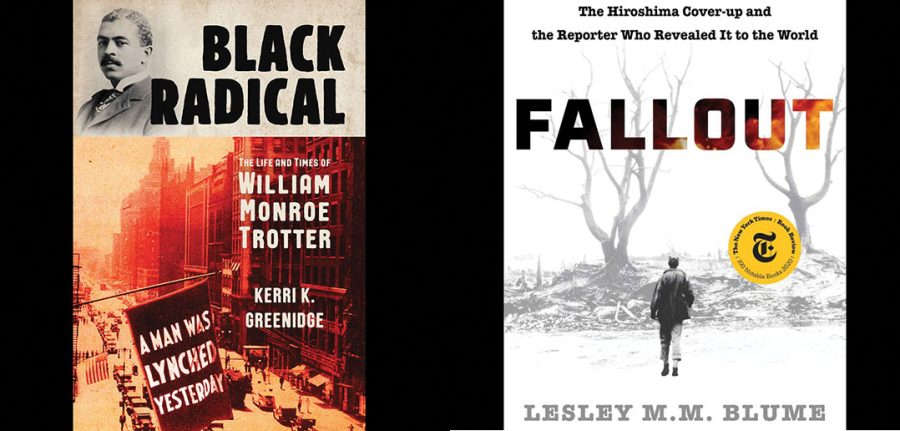Fordham Communications and Media Studies Department Awards the Sperber Book Prize
On Nov. 4, Fordham hosted the virtual 2021 Sperber Book Prize ceremony that featured a talk by each of the two winners. Kerri K. Greenidge, Ph.D., a professor at Tufts University, was a recipient of the prize for her book “Black Radical: The Life and Times of William Monroe Trotter,” and Lesley M. Blume, a journalist, won for her book “Fallout: The Hiroshima Cover-up and the Reporter Who Revealed It to the World.”
Fordham University annually awards the Sperber Book Prize to honor the life of author Ann M. Sperber. Sperber was an American author best known for her biography of renowned journalist Edward R. Murrow, a work that was praised by readers for its attention to detail and as meticulous research.
Sperber was born in Vienna, Austria, and came to the United States at four years old to escape the Nazi-controlled territory. After graduating from Barnard College, she conducted the beginnings of her research on Murrow in Germany while she was a Fulbright scholar. Sperber died at 58 years old, leading her mother, Liselotte Sperber, to establish the Ann M. Sperber Prize at Fordham University. Sperber’s book, “Murrow: His Life and Times,” was published in the University Press, drawing the Sperber family to establish a prize that would honor Sperber’s life and career: the work of journalists. The Sperber prize honors journalists — the award going to an autobiography or memoir by a journalist, or a biography of a journalist.
In opening remarks by Rev. Joseph M. McShane, S.J., president of the University, he said that the Sperber Book Prize has “become one of the most coveted prizes in journalism.”
Both Blume and Greenidge revealed the inspiration behind their works in this webinar, relating the content of “Black Radical” and “Fallout” to today’s world and issues.
The history of Greenridge’s book is rooted in incidents of racial violence, most notably the Tulsa Race Massacre, also known as the Black Wall Street Massacre. She said Trotter, the journalist featured in her book, was “a newspaperman through and through.”
“He used The Guardian to galvanize Black radicalism,” explained Greenridge.
Blume also recounted the inspiration behind “Fallout” and how her research for a new subject on nonfiction coincided with the rise of Donald Trump. “Against that backdrop, I knew that I wanted and needed to write a book depicting a story about the deadly importance of our journalists, investigative journalism and our free press,” said Blume.
After coming across the work of John Hersey and his research on uncovering the extent of America’s involvement in the Hiroshima bombing, Blume said that she found her story.
The journalists’ work and purpose of was seen clearly among the recipients of the Sperber Prize, said McShane. In the face of today’s issues and history, he said that he feels “a whole part of the American story has been invisible.”
Greenridge said she believes Trotter used his work with The Guardian to shed light on real issues that affected real people, like the events and aftermath of the Tulsa Race Massacre. Ultimately, Greenidge said that “newspapers are reflecting and inspiring actual people on the ground.”
With “Fallout,” Blume said she wanted to make sure to emphasize the role of journalists and their quests to cover things that will not be remembered unless written down. Trotter wanted to “hold a mirror up to nature” while John Hersey, Blume’s subject, wanted to hold the American government accountable, explained Blume.
In an interview with the director of the Sperber Prize, Beth Knobel, Ph.D., a journalist herself, said that even though both books are about the past, “they’re both so relevant to things that are happening today.” Greenidge’s “Black Radical” is about the Civil Rights Movement and the fight to end systemic racism through the lens of William Monroe Trotter and his use of newspapers to galvanize a marginalized group,” stated Knobel. Blume’s “Fallout” speaks on the power of investigative journalism, seen with John Hersey and his work to hold the government accountable and uncover the truths that they kept close to their chest.
In Blume’s words, Americans can see the impact of a tight-lipped government today as investigations continue to be done about the Jan. 6 riots. “Countless egregious events needed to be investigated, and the jobs of journalists could not have been more crucial,” said Blume.







































































































































































































